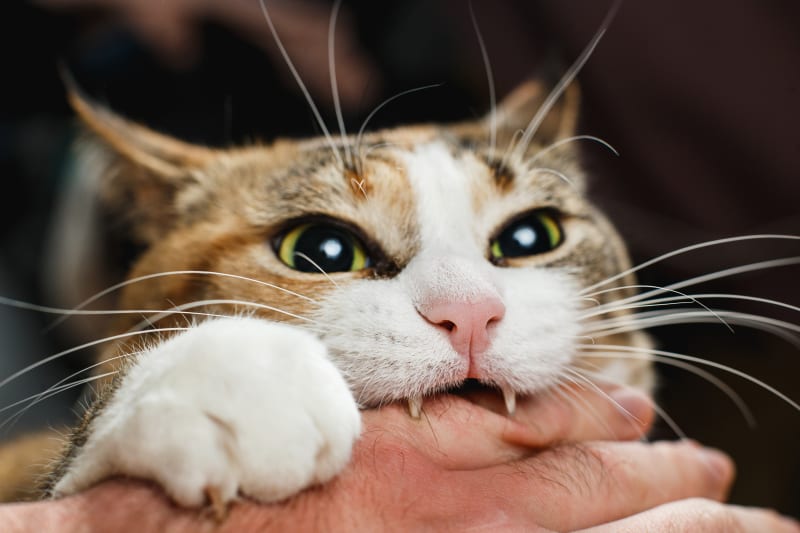
Cats are complicated animals that are frequently misinterpreted. Their actions can be nuanced and challenging to interpret. Many cat parents have probably seen their cat nip them once or twice, but they may not have understood what it meant. Knowing why your cat might bite you and knowing how to react correctly are the keys to a peaceful household environment. And when our playful cats start to get silly later on, we might be a little less inclined to join in. Though these seeming signs of aggressiveness are signs of affection, it feels like your four-legged fur baby has something against you. We are here to guide you if you have a question: why does my cat gently bite me?
An alert pet parent is undoubtedly informed when their cunning feline gives them a sneaky little nibble! I mean, that can be very hard to understand. It is accurate to say that they are “love bites” rather than a form of protection. Because they don’t intend to hurt their partner, cats’ needle-like gnashers seldom break skin or draw blood when they play. You’ll be in the “gnaw” after reading our blog because there are several things that can trigger this behavior.
My Cat Bit Me, But Why?
It’s crucial to be able to discern between the various causes why cats bite. There are a lot of them. A cat attacking you out of fear or violence requires a completely different strategy than one biting you out of love. Let’s examine some of the potential causes of a cat biting you. There are some important points to answer the question of why does my cat gently bites me.
Biting of Kittens
For kittens, biting is a normal and natural habit. They bite during teething when they are learning to play and interact with their mother and siblings, and when they are learning to hunt. This is among the many reasons kittens must remain with their mother until they’re eight weeks old. They acquire the concept of “bite inhibition” during this early play with their mother and siblings. This refers to knowing when to bite correctly and when to be gentle.
“Love bites” from Cats
Some cats may nibble and lick you when they’re caressing you. This is believed to be their attempt to acclimate you. Allogrooming, or “grooming another,” is a prevalent behavior among family members in cat colonies. With this behavior, your cat is most likely expressing affection toward you and accepting you into the family. A very kind remark from your feline companion!
Most cat “love bites” are not harmful. They often don’t hurt and don’t break the skin. As it nibbles on you, your cat will be at ease and content. This is the important point for you to answer the question of why does my cat gently bite me.
Cat Suddenly Biting while Being Petted
For pet parents, this kind of biting is frequently the most perplexing because it seems to happen suddenly! Your cat may be overstimulated or have had enough of the petting session if they are affectionately caressing you for one minute and then suddenly sinking their teeth into you. Given that cats are particularly sensitive in certain areas, this kind of behavior may be more prevalent when petting the belly or tail.
Even though this conduct sometimes seems to appear out of nowhere, there have been a few subliminal indicators. These can involve tensing of the body, flattening of the ears, tail swishing, and gazing.
Cheerful Biting of the Cat
Adult cats need to remember to schedule playtime in the same way that adults do. Cats sometimes carry over their playful hunting activities into adulthood, such as pouncing, biting, and chasing. It is noteworthy that a playful biter may develop into an aggressive biter if the cat is overstimulated or if it does not acquire bite inhibition as a kitten. This may occur if a kitten prematurely leaves its mother.
Violent Cat Bite
Violent body language, including hissing or arching the back, is typically displayed in conjunction with aggressive cat bites. There is typically a deeper cause, though. Cats frequently act aggressively out of fear, worry, discomfort, disease, or as a kind of self-defense.
Bite wounds from aggressive cats can break the skin and frequently cause infections. You must cleanse the bite completely and get guidance from your healthcare provider.
Ways to Prevent Being Bitten by Cats
It’s critical to stop or redirect your cat’s biting behavior, regardless of the cause. When your adult cat replicates the habit, what started as a cute and playful kitten nip might not look so cute anymore. Aw, Here are some pointers to help you prevent your cat from biting.
First, get your cat checked out by a veterinarian. They can identify whether the conduct is being caused by any underlying pain or medical concerns. If the conduct is novel, this is very crucial.
Stay Still
Make sure to remain motionless until your kitten stops playing with its bites. Again, you must remain still if your adult cat is playing with you. Your cat will “attack” more if you move suddenly since their innate hunting instincts will take over. After that, use a chasing cat toy to divert their attention, and when they play with the toy, give them goodies. They ought to find out soon! Give your cat lots of toys and puzzle feeders to keep them occupied.
Look at their Nonverbal Cues
It can be useful to learn to understand your cat’s body language if they suddenly start biting you when you pet them. You should be able to quit caressing them before they bite you if you can recognize the subtle signs that they’ve had enough. In case you’re unsure, it’s best to give brief caressing. Since these are often your cat’s favorite spots to pet, only pet them on the head and under the chin! Don’t touch their legs, belly, or base of the tail.
Avoid Aggressive Cats
The most difficult cat bites to recover from are aggressive ones, which typically signify that your cat is uncomfortable or stressed. In cases where your cat is exhibiting true hostility, it is best to refrain from caressing them and consult your veterinarian. They can recommend a qualified feline behaviorist to you if there are no medical issues. You need to consider the aggressiveness of cats if you are worried about why does my cat gently bite me.
Most importantly, never push, yell at, or squirt your cat—no matter what the circumstances. This will undoubtedly cause the behavior to worsen and the level of hostility to increase. Aside from the worry they cause your cat, cat bites should be avoided since they might become infected. Ideally, your kitty companion merely offers you the infrequent cuddle. No matter how mild or lighthearted it may appear, encouraging anything beyond this is never a good idea. The actions can become more severe or spread to other people. If you are worried about your cat’s behavior, you must consult your veterinarian.
When Does a Loving Cat Bite Turn into a Forceful Bite?
Between encouraging play and acting aggressively, there is a thin line. But cat owners will be able to read the symptoms when their furry friend goes too far. You will be able to recognize excessive petting-induced aggression, sometimes known as “cat love bites,” when it results from fear, anxiety, discomfort, or territorialism. It is possible to stop your pet’s emotions from getting worse by observing and interpreting body language as well as behavioral patterns under these circumstances.
A non-threatening nip isn’t meant to injure or break the skin; your pet will usually be cool, collected, and composed before applying one. Your tail-wagging cat’s defensive attitude would naturally be accompanied by threatening characteristics like growling, hissing, loud “meowing,” or clawing if they wanted to take things further and bite with force. It should be easy to distinguish between peaceful behaviors and aggressive impulses because no one knows your furry roommate better than you. If you’ve read the indications and the tide is beginning to turn, you need to move quickly.
If my Cat is Biting me, Do I Need to See a Vet?
When our cats “lash out,” they are merely attempting to connect with their fellow felines. If they appear hostile or intolerable toward interaction in any way and are exhibiting warning indicators, gradually remove yourself from that circumstance.
See your veterinarian for help if your pet is becoming aggressive and if “cat love bites” or more severe forms of biting are becoming a regular problem. It may be necessary to look into a problem that lies deeper.
Which Are the Telltale Indications That My Cat Is About to Bite Me?
It’s important to read your cat’s body language! You should be able to prevent getting bitten by a cat if you know when to approach and when to leave them alone. Thus, be alert for the following warning indicators:
- Refusing to make eye contact or stare at you
- Pupils with dilated eyes
- Ears held back or flattened against the head
- Head kept down and body position
- When the fur on their tail and spine rises, it is called piloserection.
- Tail flicking or swishing back and forth
- Snarling or hissing
Ways to Handle a Cat Bite
Even though your cat is adorable and cuddly, if you’re not careful, they can cause severe injury. They may pierce severe wounds with their razor-sharp teeth. Additionally, they can spread bacteria, so you should constantly cleanse a cat bite wound with soap and water. It’s possible that the wound around a cat bite is infected and will require antibiotic treatment if the surrounding region gets heated, bloated, oozes, or fills with pus.
Another bacterial ailment that cats can transmit to people is called cat scratch disease (sometimes called bartonellosis, named for the causative Bartonella bacterium). Particularly in those with weakened immune systems, this cat bite infection might result in a flu-like illness. It is always best to get medical attention if you have an infected cat bite.
Conclusion
There are many different reasons why does my cat gently bite me, and sometimes it’s just a natural reflex. It’s not always a sign of aggressive behaviour. You can lessen the chance of getting bitten by your cat by being aware of the many kinds of bites and the reasons behind them. There are two primary causes of cat bites. Either out of fear or if, as kittens, they picked up a bad habit of acting inappropriately around their owner. Young cats may feel intimidated by human contact if they have not had adequate socialisation from a young age (between two and eight weeks). They will thus exhibit fear-based violence, a behaviour that may persist throughout adulthood.




